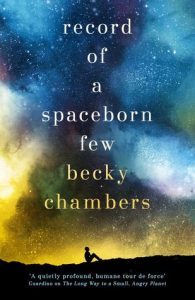Rachel Neumeier's Blog, page 224
July 31, 2018
New homes among the stars
Over at tor.com, this post by Adrian Tchaikovsky: Five Books That Find New Homes Among the Stars
When I was a kid you couldn’t move for stories where the alien-ness of the new world was the point. Certainly the ’70s equivalent of YA fiction was full of bold human explorers meeting weird planets and weirder inhabitants, even if a lot of those denizens turned out to be really very human indeed, except that some other apparent monster was their larval stage, say, or they had a symbiotic relationship with something interesting. And if you looked hard enough you could find, say, Lem’s Solaris, which is probably still the benchmark for the truly alien in fiction.
Either the alien planet trend went out of fashion, or those books just didn’t get written as much for adults, or else I just missed out a lot, but until relatively recently I just didn’t run into books about people encountering the alien on the alien’s home turf. In the last few years, though, there has been a distinct flowering (a particularly apt phrase in one case) of books about colonising the alien world, and the compromises we might have to make to do so….
Yes, I like this subgenre too. Let’s see what Tchaikovsky picks out:
1. Planetfall by Emma Newman
2. Dark Eden by Chris Beckett
3. Hidden Sun by Jaine Fenn
4. Semiosis by Sue Burke
5. Glorious Angels by Justina Robson
Yep, haven’t heard of any of them except Planetfall. No surprise: the number of recent-ish titles that I haven’t heard of is nigh unto infinite.
I rather like the sound of Hidden Sun:
Fenn’s upcoming release tells the story of a world some ways on from the starter colony of Planetfall. Here, humans have diverged into two definite populations: the more familiar Shadowkin are much like us, but cannot tolerate the direct sunlight of the world they’ve made their home. Out in the open live the Skykin, though, who have formed a symbiotic relationship with a native life form that alters them to better fit their harsh home. Hidden Sun is a cracking read, the first of an anticipated new series which obviously has a lot of secrets still to reveal.
Sounds pretty neat.
Now, there are endless older examples of this subgenre. Here are the five I thought of first:
1. Survivor by Octavia Butler. Certain problematic themes, but I like the book quite a bit and I’m glad I have a copy. Butler never approved a re-issue and physical copies are now very, very hard to come by. If you’ve never read it and you’d like to, you can find pdf copies online.
2. The Integral Trees by Larry Nivan
3. Dune by Frank Herbert
4. 40,000 in Gehenna by CJC.
5. Foreigner by CJC. I’m not sure why I didn’t think of that first. Maybe because the struggle to colonize the world is long over by the time the story opens. But this may be the only colonization story where humans don’t wind up the dominant species on the planet. Any other examples? Actually, Gehenna, above, might arguably be a second example of humans not being dominant, but it’s totally different.
I feel like there are lots more. Oh, here’s another humans-colonize-a-new-world story:
6. Courtship Rite by Donald Kingsbury. I liked it a lot, but I’ve only read it once.
And another:
7. The Word for World is Forest by Ursula LeGuin
Now that I’ve hit seven, I feel I should try to get to ten. So … let me see … okay:
8. Mother of Demons by Eric Flint. I liked this one a lot.
9. Red Mars, Blue Mars, Green Mars by KSR. Conquering a new world through technology, no need to deal with aliens.
10. Freedom’s Landing by Anne McCaffery. Never actually read this one, but I know it starts with humans being picked up by aliens and dumped on a new world. Anybody read this? What did you think?
Any examples of this subgenre you’d like to contribute to the list? Drop ’em in the comments!
Please Feel Free to Share:









July 30, 2018
Remember that giant black sarcophagus?
You probably recall the recent discovery of the giant sarcophagus in Alexandria.
Had you read about the red liquid found in there, along with the three skeletons? — Incidentally, I haven’t read anything discussing why three people would be put in a single sarcophagus; I wonder whether that was common and if not, why was it done in this case?
Anyway:
Horrifying images of a trio of skeletons floating in the murky soup led to rumours the “mummy juice” contained medicinal or supernatural properties, with locals anxious to bottle the stuff…
Of course it did. They could super-dilute it 100,000,000 to 1, as with homeopathic “medicines,” and make a fortune. Probably at that kind of dilution it would even be harmless. Not that I would want it anywhere near me. Especially since it is evidently sewage water that leaked into the sarcophagus.
Nevertheless: “We need to drink the red liquid from the cursed dark sarcophagus in the form of some sort of carbonated energy drink so we can assume its powers and finally die,” petition founder Innes McKendrick wrote by way of explanation.
I particularly like the “and finally die” thing. I wonder if McKendrick and those who are signing his petition are all immortal and bored with life, or if he just is not quite able to write sentences that mean what he actually wants them to mean, whatever that is.
Please Feel Free to Share:









Not sure these strike me as hyper-realistic but they are hyper-neat
The images may look like the real deal, but these are in fact the work of the very talented painter Kevin Peterson. He has blended together the images of young children together with very realistic animals throughout various urban locations.
These are wonderful fantasy paintings. The animals are indeed very true-to-life, and I’m so pleased Peterson featured a spotted hyena in one because hyenas are fascinating and wonderful and don’t get nearly the appreciation they deserve.
All the paintings feature a child in a post-apocalyptic landscape; not all of them feature animal companions. Naturally I am all about the animal companions, but click through and admire the whole range. I really like the one of the little girl in the blue dress standing on top of the abandoned car, even though no animals are in sight.
Please Feel Free to Share:









July 26, 2018
Three ingredients for space travel
Here’s a fun post by Becky Chambers, over at tor.com: Three Ingredients for Space Travel
If you have the chance to go listen to a talk by an astronaut, and if there’s a Q&A afterward, there are three questions that I can pretty much guarantee will come up: What do you eat in space? Where do you sleep? And of course, the old standby—how do you go to the bathroom? The age of the audience is irrelevant, as is the topic of the talk. You might have just sat through an hour on the politics of space policy, or on the future of planetary exploration, but regardless, inevitably, there will be some curious audience member for whom a Google search is not enough. They must know, human to human, how daily necessities are handled when the stability of a planet has been removed from the equation….
My latest book, Record of a Spaceborn Few, is all about one specific home, so it’s unpacked slowly throughout. The reason this kind of set-dressing is so fundamental—whether I’m talking about my books or other books or the questions asked of astronauts—boils down to this:
The characters aren’t the only ones going on a journey. The audience is, too.
This book just came out yesterday. I’d like to read it, but I haven’t got it yet because when I clicked over just now, I found out it’s $11.99 for the ebook. Who thinks that is a good price … ah, Harper Collins. Well, it’s not a good price for an ebook. It’s a bad price. I wonder what proportion of all the people who would like to buy this book right this minute are putting it off because, like me, they are not keen on paying that much for an ebook?
Even Ilona Andrews newest … Iron and Magic, which promotes her secondary villain character Hugh d’Ambray to protagonist status … is half that. Ilona Andrews. Half that price. And who set that price? Ilona Andrews; this one is self-published.
No wonder self-published ebooks outcompete Big Five ebooks. It’s like a micro-lesson on economics right there.
I wasn’t necessarily going to get Iron and Magic because villain pov is not my favorite thing. But this looks like probably a redemptive character arc. That is my favorite thing. So, sure. Especially at that price.
Didn’t mean to segue into a post on ebook prices. I was just startled when I clicked over to Amazon to look for Record of a Spaceborn Few, and found it priced that high. Eventually I’ll pick it up, either when the price comes down, or when I am exactly in the mood for that one book and no other will do, or when prices for physical copies come down, or whenever.
Incidentally, you know what is half the price of Iron and Magic right now?
Officially out tomorrow, but available for preorder right this minute!
Please Feel Free to Share:









July 25, 2018
Shocked, shocked —
Where the Devil’s Kettle ‘Waterfall to Nowhere’ Really Goes: It turns out the water doesn’t disappear at all.
Yes, well, the disappearing waterfall makes a nice story, but surely no one really thought the water … disappeared?
If the water was actually vanishing, how long would it take the Netherlands to conquer the world, do you suppose?
Well, that is a side question. The actual question: where does the water that flows down the “waterfall to nowhere” actually go?
Apparently: nowhere at all, so not an entirely inapt name.
The measurements showed that none of the water was actually leaving the river, which meant all of the flow that tumbled into the Devil’s Kettle and seemed to disappear actually rejoined the stream at the base of the falls. Green told me they don’t know exactly where it re-emerges, but you can see two distinct “boils” of water at the base of the falls. He suspects the Devil’s Kettle empties out right below where it flows in.
Boring! But at least now we know.
Other recent disappointments: the giant black sarcophagus apparently did not contain either the remains of Alexander the Great or a curse.
Sometimes life is less like a fantasy novel than one might wish.
Not that I would prefer a curse. I guess.
Please Feel Free to Share:









This thing with Worldcon
I wonder if you’ve heard snippets about this thing with WorldCon, where the convention organizers declined to put Hugo nominees on panels on the grounds that they are not famous enough to be on panels?
Pretty much in so many words?
A train wreck then ensued, of course, rapidly crashing off in multiple directions. Since this was entirely predictable, I can’t imagine what they were thinking. Honestly, no slots for the actual nominees, nominated by WorldCon attendees, because they are not well known? Farcical on its face, and then on top of that, obviously one way newer authors get to be better known is by appearing on panels at conventions. I thought it was utterly standard to put together as many panels as possible with one widely recognized author and then several who are not as well known.
Anyway, if you heard something about this and wondered, you can read what seems to be a clear, thorough, straightforward account of the mess here: Foz Meadows put up a great post a few days ago that covers the whole thing.
The WorldCon organizers have now taken down their initial programming. I don’t know that I would trust them to put together any remotely acceptable program, but actually they turned the problem over to Mary Robinette Kowal, who is putting together a small team to fix the program. I expect she’ll do a good job.
Please Feel Free to Share:









July 24, 2018
This is funny
A 23-foot diameter model of the moon apparently got lost in the mail.
I am trying to imagine losing a box that big.
This is not an item that could roll under the couch and disappear.
Each centimetre of the internally-lit spherical structure represents 5km (three miles) of the moon’s surface….The floating artwork, which is illuminated and accompanied by music from different composers, was created in partnership with the University of Bristol and the UK Space Agency.
Sounds like a pretty snazzy item. I hope someone trips over the giant box soon so the model makes it to all the events where it’s supposed to appear.
Please Feel Free to Share:









All the background to CockyGate, if you care
I’m sure you remember that author, Faleena Hopkins, who attempted to copyright the word “cocky” so only she could use it in book titles.
Here is the loooong, detailed story of what was going on in world of Indy Romance Publishing, wherein this thing with “cocky” was a relatively small detail.
My basic reaction: If I had only leaped in early enough with dishonest techniques to game Amazon’s system, I’d probably be a lot wealthier than I am now. Alas, I never think of all these kinds of things. I’m always shocked when I find out what other people have been doing.
My second reaction: Amazon will never, ever catch up to scammers. As in every field, scammers act and business react. There’s no way even for smart, dedicated people to figure out what crazy things smart, dishonest people will come up with in time to stop them.
Well … it’s all very interesting, anyway. If you think so too, click through and read the whole thing.
Please Feel Free to Share:









Yet another awful Bujold cover
At tor.com, this post: Rereading the Vorkosigan Saga: Diplomatic Immunity
Which features this edition of the book in question:
Sigh.
I don’t know what it is with LMB’s Vorkosigan books. I know publishers are responsible for some of the covers and that she herself is responsible for others. But I still think near-uniformity of awfulness suggests an actual curse.
Somewhere, someone is poking pins in an effigy of a Vorkosigan book, murmuring spells to ensure that never — never — will a Vorkosigan book get published with a good cover.
Anyway … for some reason, though I don’t think it’s one of her best, I have recently had a faint urge to re-read Cryoburn. Probably I will, after I finish the book I’m currently reading — Liz Williams 4th Detective Chen novel.
Please Feel Free to Share:









Have you been plagiarized?
Here is a quite interesting post: 5 Steps to Prove You’ve Been Plagiarized
If there’s one thing that I’ve learned over the past 13 years of running Plagiarism Today, it’s that a LOT of people think they’ve been the victim of plagiarism.
However, those who are right and can prove it are the exception to the rule. … proving you are a victim of plagiarism, enough to convince a court of law, is extremely difficult. So, before you either hurl accusations or, worse yet, file a lawsuit, it makes sense to see if you can actually prove your case.
Five steps:
1. Prove your idea was original. The author of this post, Jonathan Bailey, says this is no problem with verbatim text but next to impossible for ideas. That certainly sounds right to me.
2. Show that what was copied could be protected. Here Bailey means that ideas are not protectable under copyright law, although the exact expression of those ideas is. This makes sense as well.
3. Show the plagiarist had access. That certainly seems necessary.
4. Show that the plagiarized work is sufficiently similar to your work to establish it was stolen. There’s where most important judgment calls would be made, I expect. Bailey says that strings of twelve identical words can be sufficient to establish that the derivative work was copied from yours.
5. Prove the copied material lacks attribution. Well, that immediately seems silly, but Bailey says, “This might seem silly [my exact response, as you see] as it should seem pretty obvious whether or not a use is attributed, but that isn’t always the case.” Then he gets into incorrect citations in academic papers, which, sure, I get that this can be a problem, but it wasn’t what I was really thinking of as plagiarism.
The bottom line:
Because of this, it’s important to not ask “Did plagiarism take place?” and instead ask “What plagiarism can we prove?” When we look too long and hard at plagiarism percentages or word counts, we often miss the more important questions about plagiarism…While being a victim of plagiarism can be costly (both emotionally and practically), it’s not nearly as costly as making allegations that the evidence does not support.
Please Feel Free to Share:

















